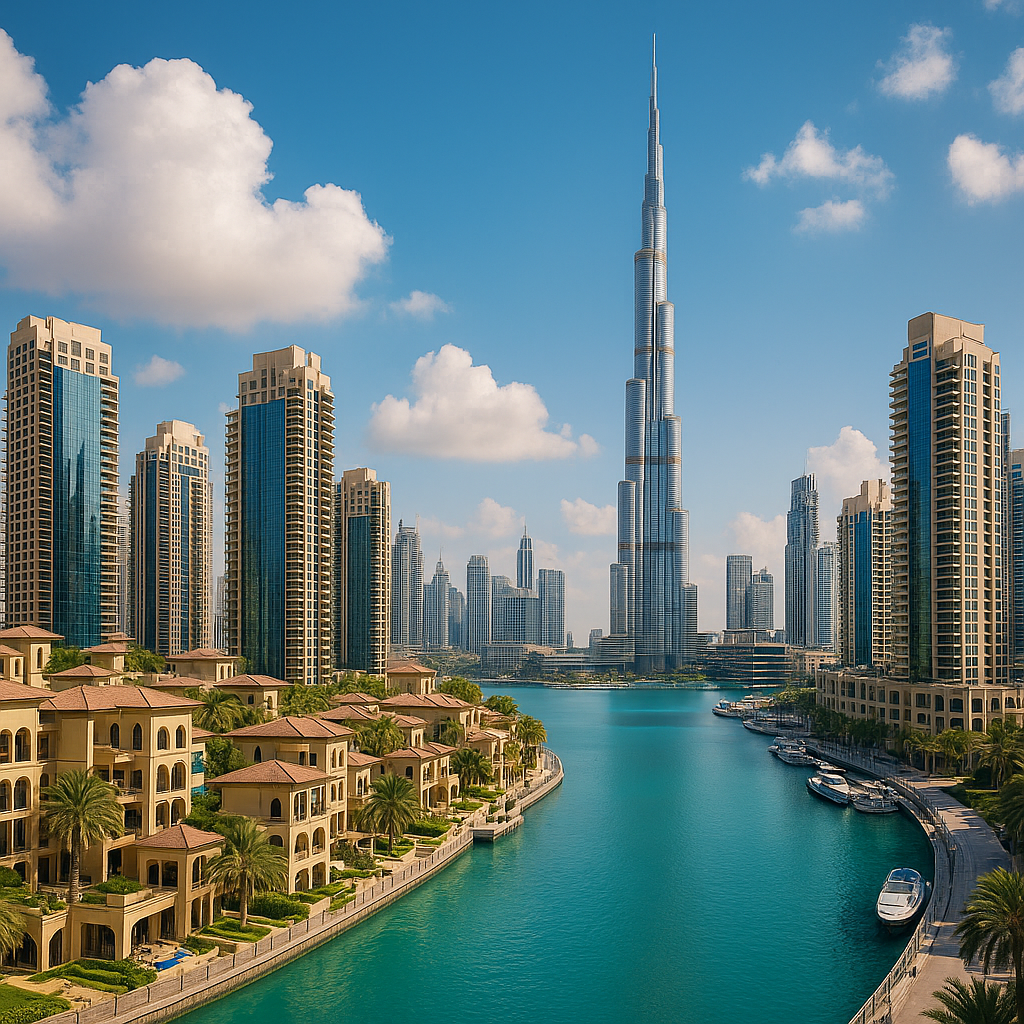Buying Property in Dubai for Foreigners: Laws and Procedures 

Introduction
Why Dubai is a top destination for foreign investors
Dubai offers a clear regulatory environment, world-class infrastructure, and an open economy that attracts foreign capital—along with streamlined, fully digital ownership processes via the Dubai Land Department (DLD). The emirate provides a wide mix of residential and investment options—from apartments to villas and townhouses— within designated freehold zones for foreigners.
Recent figures and ongoing foreign investment momentum
Market performance indicates continued foreign inflows, supported by easier procedures, transparency, freehold ownership in designated areas, and longer-term residency pathways for eligible buyers under the Golden Visa programme. For the official legal framework on expatriate ownership, see the UAE Government Portal: u.ae – Expatriates buying property in the UAE.
Who can buy property in Dubai?
Eligible profiles (residents, non-residents, business owners, individual investors)
Any individual of any nationality can purchase property in Dubai’s freehold areas—whether resident or non-resident—including individual investors and business owners. Prior UAE residency is not required to complete a purchase; however, mortgage requirements may differ for residents vs. non-residents.
Nationalities & laws (any nationality restrictions?)
There are no nationality-based restrictions for buying within designated freehold areas. Compliance with local laws, registration with the DLD, and using escrow accounts for off-plan projects are essential. Official details are published here: u.ae – Buying property in Dubai.
Foreign ownership laws in Dubai
Freehold vs. Leasehold (Usufruct)
Freehold: grants full, time-unlimited ownership for foreigners in designated areas.
Leasehold/Usufruct (long-term lease): provides the right to use a property for a fixed term (e.g., up to 99 years) without owning the underlying land. Review the concepts on u.ae.
Ownership duration & types
Freehold has no expiry in freehold zones. Leasehold is limited to the term agreed in the contract. Always confirm the tenure type shown on your Title Deed issued by the DLD.
Differences between owning apartments vs. villas
Apartments are typically part of jointly owned properties with service charges for common areas; villas often provide greater control over land and gardens, with community service fees varying by development. Both are open to foreigners within freehold zones.
Freehold areas open to foreigners
Dubai allows foreign freehold ownership across many neighbourhoods. Below are common examples with suggested internal links (replace with your own site pages if available):
- Dubai Marina – High rental demand in a prime waterfront district; ideal for luxury apartments with marina views.
- Palm Jumeirah – Ultra-luxury villas and sea-view apartments for a resort-style lifestyle.
- Dubai Hills Estate – Family-centric community of villas, townhouses, and apartments near schools, parks, and golf.
- Arabian Ranches – Quiet villa and townhouse communities with comprehensive family amenities.
- Downtown Dubai – The city’s vibrant heart; premium apartments close to business and entertainment.
- Dubai South – Growing district with accessible entry prices near Al Maktoum International Airport and Expo City Dubai.
For official ownership and registration guidance, rely on government sources: Dubai Land Department, u.ae – Buying property in Dubai, and Invest Dubai.
Area strengths (investment, family, luxury, value)
- Investment-led: Dubai Marina, Downtown Dubai – high rental demand and strong resale liquidity.
- Family-oriented: Dubai Hills Estate, Arabian Ranches – schools, parks, clubs, and excellent liveability.
- Luxury: Palm Jumeirah – trophy villas and premium apartments with beachfront living.
- Value/Growth: Dubai South – competitive prices, flexible developer plans, and long-term upside.
Official & trusted links
Legal Steps for Foreigners Buying Property in Dubai
Verify the property and developer through the Dubai Land Department (DLD)
Start by checking the project, developer status, and escrow account on the official Dubai Land Department (DLD) portal. You can also review the UAE Government platform u.ae – Buying property in Dubai to understand the general procedures.
Sign the Sale Agreement (Form F)
The approved Sale Agreement (Form F) is issued by a licensed broker and registered with DLD. Review all clauses carefully before signing, ensuring the price, payment schedule, and handover conditions are accurate.
Open an Escrow Account
For off-plan projects, payments must go into a registered escrow account with DLD. For more details, check the official DLD portal under “Escrow Accounts” and developer services.
Pay the Dubai Land Department fees (4%)
Registration fees of 4% of the purchase price are payable to DLD, plus a small admin fee. Full details of payment procedures are available on the DLD website.
Obtain the Title Deed
Once the contract and payments are completed, the Title Deed is issued in your name through DLD’s digital channels or service centers. Keep contracts and receipts for financing or resale purposes.
Property Financing for Foreigners in Dubai
Banks offering home loans to foreigners
- Emirates NBD – Home Loans
- HSBC UAE – Home Loans
- Mashreq – Home Loans
- FAB – Home Loans
- ADCB – Home Loans
Loan-to-value ratios for residents vs. non-residents
LTV ratios vary by bank and credit profile; residents can often borrow up to ~80% of property value, while non-residents typically qualify for ~50%–70%. Always confirm with individual banks.
Income requirements and guarantees
Banks require proof of stable income, bank statements, credit reports, plus property valuation and life/property insurance. Check each bank’s mortgage page for exact eligibility criteria.
Examples of developer payment plans
- Emaar Properties – Offers construction-linked and post-handover plans.
- DAMAC Properties – Flexible installment options for off-plan projects.
- Nakheel – Varied payment schemes depending on the community.
Additional Costs to Know
DLD Registration Fees
Includes the DLD registration fee (usually 4% of purchase price) plus Title Deed issuance and admin charges. Full details available via the official DLD portal.
Annual Service Charges
Levied by Owners’ Associations for maintaining common areas, often charged per square foot per year. Refer to the Service Charge Index via the DLD.
Furnishing and utilities
Covers furniture, appliances, and utility connections (DEWA for electricity/water, internet). Typically 5%–10% of property value.
Real estate agent fees
Broker commission is standard in the Dubai market and contractually agreed. Ensure you work with a DLD-registered agent.
Benefits of Buying Property in Dubai as a Foreigner
ROI and current performance
Many Dubai communities offer strong rental yields and capital growth, particularly in waterfront and well-serviced areas.
Eligibility for the Golden Visa
Buying property above a certain threshold can qualify you for the UAE Golden Visa subject to government criteria.
Transparent legal framework and safety
Dubai’s property market is regulated by clear laws, digital processes via DLD, and strong buyer protections.
No income or property tax
No personal income tax or annual residential property tax is levied in Dubai, maximizing investor net returns.
Risks and Potential Challenges
High service charges in some developments
Elevated fees can reduce net ROI, so compare annual service charges between projects before purchasing.
Risks of off-plan purchases
Stick to reputable developers, ensure payments go into registered escrow accounts, and review construction timelines and delivery conditions carefully.
Price fluctuations in some areas
Market cycles can impact property values. Diversify your portfolio and focus on areas with sustainable demand and strong infrastructure.
Practical Tips for Foreign Investors
How to Choose the Right Area?
Your choice of location depends on your investment goal. If you are looking for strong rental yields, tourist hotspots like Dubai Marina and Downtown Dubai are ideal. If your goal is family living, communities such as Dubai Hills Estate and Arabian Ranches are more suitable.
The Importance of Checking Developer Reputation
Before buying any property, check the developer’s reputation through the Dubai Land Department (DLD). Research their past projects, delivery timelines, and finishing quality.
Work with a Licensed Local Real Estate Advisor
Having a licensed real estate advisor in Dubai helps you avoid legal and financial mistakes, and provides you with up-to-date information on the market and expected ROI. Always ensure the broker is registered with the DLD.
Frequently Asked Questions (FAQ)
Can foreigners own 100% property in Dubai?
Yes, foreigners can own freehold property at 100% in designated areas such as Dubai Marina and Palm Jumeirah.
Does buying property grant a Golden Visa?
Yes, purchasing a property worth AED 2 million or more qualifies you to apply for the UAE Golden Visa for 10 years, renewable.
What is the minimum investment required for residency?
The minimum requirement is AED 2 million as per the latest UAE government updates.
Can foreigners get bank financing?
Yes, UAE banks such as Emirates NBD and HSBC provide mortgages of up to 70% for non-residents.
Can non-residents buy property remotely?
Yes, non-residents can purchase property in Dubai remotely through licensed real estate agents and digital services by the DLD e-services, including the “Dubai REST” app.
Conclusion
Buying property in Dubai as a foreigner is a unique opportunity that combines strong investment returns, legal stability, and a highly attractive living environment. By following the right advice and understanding the laws, you can ensure a safe and successful deal.
Call to Action: If you are considering buying property in Dubai, contact us directly on WhatsApp for a consultation: Click here to connect instantly .
